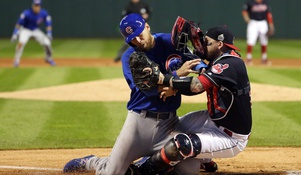Folklore Behind World Series Teams Epitomizes Baseball's Greatness
CHICAGO/CLEVELAND-Last night, the Chicago Cubs made history by reaching the World Series for the first time in 71 years with their 4-2 NLCS win over the very formidable Los Angeles Dodgers; it has been 108 years since they won their last World Series in 1908. While it has only been 19 years since the Cleveland Indians last reached the World Series, it has been 68 years since they last won the World Series. The mere fact that neither of these storied franchises has gone so long without winning the game's greatest prize is enough to make this year's edition of the Fall Classic compelling. That being said, Major League Baseball, unlike the other big three North American sports' leagues (NBA, NFL, NHL) is so steeped in history, tradition and folklore (especially the latter) that there is much more than meets the eye than just a combined 176 years between World Series championships.
Much has been made of the "Curse of the Billy Goat" that has allegedly afflicted the Chicago Cubs since 1945. While seemingly ridiculous on the surface, a grain of truth can be still be found in this bit of baseball folklore:
"The Curse of the Billy Goat is a sports-related curse that was placed on the Chicago Cubs Major League Baseball franchise in 1945 when Billy Goat Tavern owner Billy Sianis was asked to leave game 4 of the World Series against the Detroit Tigers at the Cubs' home ballpark of Wrigley Field because the odor of his pet goat (named Murphy), was bothering other fans. He was outraged and allegedly declared 'Them Cubs, they ain't gonna win no more,' which has been interpreted to mean that there would never be another World Series game won at Wrigley Field. The Cubs have not won a World Series since 1908 or played in one since 1945." (Source: Wikipedia)
Next week, the Chicago Cubs will have their chance to rebuke Billy Sianis's claim (and its interpretation) when the World Series shifts from Cleveland (Tuesday, October 25 and Wednesday, October 26) to Chicago's North Side for games three, four and five (if necessary) next Friday (October 28), Saturday (October 29) and Sunday (October 30).
While much has been made of the aforementioned curse*, there is also some folklore surrounding the Cleveland Indians that could also be used to explain their inability to raise the World Series flag for the first time in 68 years. According to legend, the Cleveland Indians buried their 1948 World Series Pennant. It has never been found, leading me to wonder if a curse has been placed on the Cleveland Indians for misplacing their 1948 Pennant. MLB.com's Anthony Castrovince explains in "Whereabouts of Tribe's '48 title pennant remains a mystery:"
"With the ceremonies underway, (Bill) Veeck, (Indians; Owner) dressed as a mortician, sat atop a horse-drawn hearse of a late-1800s vintage while carrying a copy of the Sporting News (because baseball people referred to it as their "Bible"). Boudreau, his coaches and other team personnel served as pallbearers. A band played a funeral dirge, with the procession moving toward the center-field flagpole, where the pennant was lowered and placed in a pine coffin. The pallbearers put the pennant in a hearse, and the hearse made a circle around the playing field, with the Indians' players joining in the procession when it reached the home dugout. Finally, the coffin was lowered into a grave just beyond the outfield wall, marked by a tombstone with the inscription, "1948 CHAMPS."
"Although the title drought dated back to 1918, the sale of Ruth to the Yankees was completed January 3, 1920. In standard curse lore, Red Sox owner and theatrical producer Harry Frazee used the proceeds from the sale to finance the production of a Broadway musical, usually said to be No, No, Nanette. In fact, Frazee backed many productions before and after Ruth's sale, and No, No, Nanette did not see its first performance until five years after the Ruth sale and two years after Frazee sold the Red Sox. In 1921, Red Sox manager Ed Barrow left to take over as general manager of the Yankees. Other Red Sox players were later sold or traded to the Yankees as well.
Neither the lore, nor the debunking of it, entirely tells the story. As Leigh Montville wrote in The Big Bam: The Life and Times of Babe Ruth, No, No, Nanette had originated as a non-musical stage play called My Lady Friends, which opened on Broadway in December 1919. That play had, indeed, been financed as a direct result of the Ruth deal. Various researchers, including Montville and Shaughnessy, have pointed out that Frazee had close ties to the Yankees owners, and that many of the player deals, as well as the mortgage deal for Fenway Park itself, had to do with financing his plays." Source: Wikipedia
Another popular Major League Baseball that endured until 2005 was *The Curse of the Black Sox/Shoeless Joe:"
"The White Sox were dealt a severe blow in 1919 by the Black Sox scandal, with several star players being suspended at a crucial time late in the 1920 season. Conventional wisdom has it that the Sox were headed for another pennant and championship and that the suspensions knocked them out of the race. In reality, the last game for the "Eight Men Out" was September 27, just three games from the end of their season. At that point the Sox had won 3 in a row and were sitting at 95-56 with 3 games to play.The Cleveland Indians were also in a hot streak, at 94-54 with 6 games to play, and halfway through a four-game sweep of the St. Louis Browns. The Indians were just a few percentage points ahead of the White Sox.
The Indians would close the season with 4 wins and 2 losses, and finish with a 98-56 record. The Sox would lose 2 of their final 3 to finish 96-58. If the Sox had swept their final series against the Browns and the Indians record stayed the same, the American League would have had its first pennant playoff. Even discounting any morale boost the Indians might have received from the news of the Sox players' suspensions, the Sox return to the World Series was by no means ensured, even if there had been no suspensions. If they had finished tied, it would be noted that the Indians had won 12 of the clubs' 22 meetings, but the Sox had taken 2 of 3 in their most recent series." Source-Wikipedia
As for who I think will the 2016 World Series, while the Cleveland Indians have proven that they are more than capable of shutting down such strong American League power houses as the Boston Red Sox (ALDS) and the Toronto Blue Jays (ALCS), I predict that the Chicago Cubs will finally get the Billy Goat off their backs by winning the 2016 World Series, especially now that Anthony Rizzo snapped out of his slump against the Los Angeles Dodgers, proof that you can't keep a good team (or good players) down for long.
It's unfortunate that one of these storied franchises can will lose the 2016 World Series as there is no such thing as Co-Champions (only co-MVPs of the National League Championship Series, re: Javier Baez and Jon Lester). Had the Baseball Gods been on the Cleveland Indians' side, then they would have defeated the Florida Marlins in the 1997 World Series. Ironically, it was the Marlins that ended the Cubs 2003 World Series hopes by overcoming a three-games-to-one deficit in the 2003 NLCS. As for the Chicago Cubs, even if they were to lose the 2016 World Series, their fans won't have to wait too long for another as this team is built to win multiple championships.
No matter which team you want to win, the 2016 World Series promises to be one of the most storied of all-time as the Cubs attempt to vanquish the Curse of the Billy Goat while the Indians hope to overcome the Legend of the Missing/Buried 1948 Title Pennant. It's stories like these two that make Major League Baseball worth watching.





